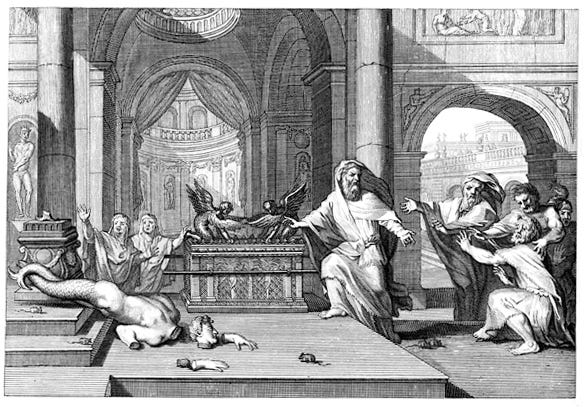“Therefore the LORD, the God of Israel, declares: ‘I promised that your house and the house of your father should go in and out before me forever,’ but now the LORD declares: ‘Far be it from me, for those who honour me I will honour, and those who despise me shall be lightly esteemed.” (1 Samuel 2:30)
In many ways, 1 and 2 Samuel may be read as a working-out of the principle stated by God in the above verse: “those who honour me I will honour, and those who despise me shall be lightly esteemed.” Initially uttered as a judgment upon the house of Eli, this statement forms one of the major themes of the two books, with different figures emerging on either side of the divide. On the one hand, we are met with various man-honouring figures such as Eli, Hophni, Phinehas, and Saul; on the other, we find various God-honouring figures in the persons of Hannah, Samuel, and David. The basic question, however, remains constant: Who will be glorified? Who will receive honour? Those who glorify Yahweh will themselves be glorified (1 Sam. 9:6; 2 Sam. 6:22), but those who despise Yahweh (by giving glory to others) will be “lightly esteemed.”
The word “glory,” translated by the ESV in this text as “honour,” is a term that carries with it the idea of weight or heaviness. To give glory or honour to someone is to ascribe a certain degree of weight, significance, or value to them. This is why Eli is condemned in this passage. His sin was honouring his sons above Yahweh — giving more weight to them than to God (v. 29).
By contrast, Samuel is presented in the text as an example of what it is to give proper honour or weight to Yahweh as the King of Israel. Through a life of obedience yielded to God in humility and faith, Samuel gives Yahweh the glory He is due. Samuel is consequently exalted, while Hophni and Phinehas are removed from their positions to perish in ignominy and shame (1 Sam. 4).
Those who honour Yahweh are themselves honoured, but those who despise Him will be lightly esteemed.
As it turns out, this principle is more than a helpful hermeneutical key to understanding the books of 1 and 2 Samuel; it is fundamental to grasping the nature of reality itself. The question of who or what we honour — as individuals, families, institutions, governments, and whole cultures — is among the most important and profound questions of our day. What is it that we honour? To whom do we ascribe weight, authority, and glory? If it is anything or anyone other than the triune God, we are setting ourselves against the very shape and trajectory of reality, which is determined to give all glory to its Creator.
In fact, this is precisely the reason why the West broadly, and Canada particularly, is in such dire straits. Although we know God, we have not honoured Him as God or given thanks to Him (Rom. 1:21). We have thus become futile in our thinking and our foolish hearts are darkened. Or, to put it another way, we are all far more like Eli than Samuel, honouring mere men above the living God. And His judgment against us is just.
Even so, we would be remiss to forget the incomparable grace and mercy of God — a God who does not retain His anger forever but delights in steadfast love (Micah 7:18). As Scripture testifies, and as the coming of the Son of God demonstrates with sterling clarity, the God who reigns from Heaven is one who “relents over disaster” and gladly shows mercy to the most wretched of sinners (Joel 2:13).
The great need of our day is thus to heed the wisdom of the psalmist; to kiss the Son lest he be angry, and we perish in the way (Ps. 2:12). We should remember that reality is structured so as to one day give all glory to Christ as Lord (Phil. 2:10-11). Seas and rivers, hills and nations will clap their hands and sing together for joy when He comes to judge the earth (Ps. 98:7-9). The obligation that rests upon each of our shoulders, therefore, is to simply lay aside the burden of hubris and join the chorus.
And what’s more, all those who honour Christ in this age have the promise that their faith will result in praise and glory and honour at the dawning of the next (1 Pet. 1:7). Those who honour Christ — the focal point of all glory and the only King deserving of the collective praises of creation — He will honour. But those who despise Him shall be lightly esteemed.
Hannah’s words are thus true and immortal: Yahweh “raises up the poor from the dust; he lifts the needy from the ash heap to make them sit with princes and inherit a seat of honour” (1 Sam. 2:8).
May God raise up many fearless and Christ-honouring saints in our day, for the good of the world and the praise of His glorious grace.




Thanks
Soli Deo Gloria!